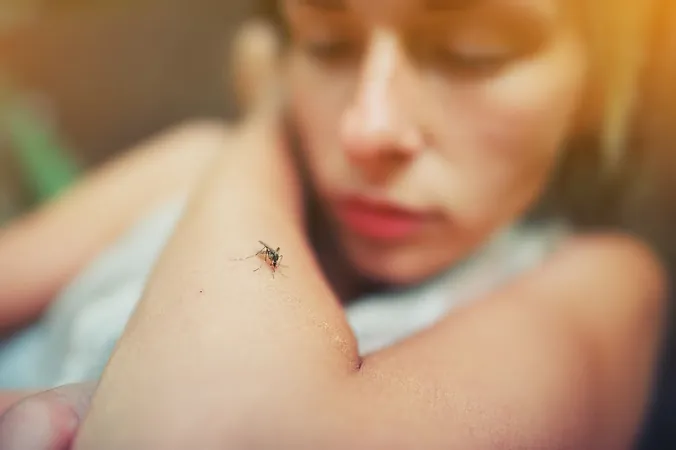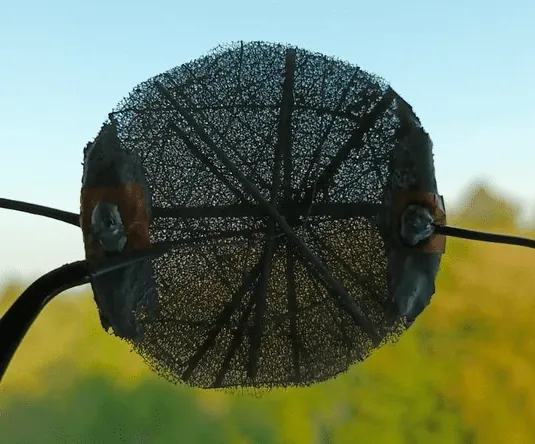
Beware! The 8 Deadliest Insects Lurking in Washington State
2024-12-16
Author: Amelia
1. Yellowjackets: The Aggressive Wasps of the Skies
Commonly found buzzing around gardens and backyard barbecues, yellowjackets (Dolichovespula arenaria) are a part of the vespidae family and are easily identifiable by their black and yellow stripes. While they might look harmless, these wasps can be quite aggressive. They will fiercely protect their nests, causing painful stings that can lead to allergic reactions in sensitive individuals. If you spot one, admire from a distance!
2. Bald-Faced Hornets: A Painful Encounter Awaits
Despite their name, bald-faced hornets (Dolichovespula maculata) are actually wasps and not true hornets. With their distinctive black and white coloring, they can be intimidating. They are generally not prone to aggressive behavior unless their nests are threatened. However, their stings are incredibly painful and can be dangerous for those with allergies. It’s best to give these hornets a wide berth.
3. Northern Giant Hornets: The Fearsome 'Murder Hornets'
The notorious northern giant hornet (Vespa mandarinia), often referred to as 'murder hornets,' is the largest hornet species in the world, measuring about 1.75 inches long. Although sightings in Washington have been rare in recent years, these hornets are highly aggressive and have the potential to inflict multiple painful stings that can deliver a hefty dose of venom, leading to severe medical consequences. If you spot one, report it to local authorities immediately!
4. Essential Bees: Honeybees and Bumblebees
While honeybees and bumblebees are crucial for pollination and thus the survival of many plants and food systems, they can pose a risk if provoked. The well-being of species like the endangered western bumblebee (Bombus occidentalis) is paramount, yet their defensiveness can lead to painful stings, especially for those allergic to the venom. Respect their space, and they will contribute positively to your environment.
5. Mosquitoes: The Summer Plague
Mosquitoes (family: Culicidae) are notorious pests during summer months. They can carry harmful diseases such as West Nile virus, particularly the Culex tarsalis and Culex pipiens species. While the western treehole mosquito (Aedes sierrensis) isn’t a major health threat, it can still cause problems for pets, such as heartworm disease in dogs. Take preventative measures with repellents and protective clothing when outdoors.
6. Blister Beetles: Nature’s Tiny Tormentors
With their striking colors, blister beetles (family: Meloidae) may look beautiful, but they deliver a painful reminder of their name. Crushing these beetles releases cantharidin, a toxic substance that can cause skin blisters and irritation. Additionally, these beetles can be deadly to horses if ingested in hay. Always handle these insects with care, if at all.
7. Assassin Bugs: The Kissing Bugs with a Deadly Bite
Known mischievously as "kissing bugs," assassin bugs (genus: Pselliopus) may help control pest populations, but they come with risks. Their bite can be painful and may carry the parasite responsible for Chagas disease. Stay vigilant and avoid contact when encountering these deceptively charming insects.
8. Carpenter Ants: Silent Destroyers of Your Home
While carpenter ants (genus: Camponotus) may not be venomous, they can cause significant structural damage to your home. These wood-destroying insects create extensive tunnels and nests within wooden structures, weakening them over time. If you suspect an infestation, seek professional help to ensure the integrity of your living space.
Conclusion: Coexisting with Nature’s Inhabitants
As we explore the beautiful outdoors of Washington, it’s crucial to understand the presence of these insects. While they may seem alarming, remember that they play important roles in our ecosystem. Educating ourselves about their behaviors and how to respond to encounters is key to minimizing risks—especially for those with allergies or sensitivities. So get outside, enjoy nature, but stay informed to ensure a safe adventure!









 Brasil (PT)
Brasil (PT)
 Canada (EN)
Canada (EN)
 Chile (ES)
Chile (ES)
 España (ES)
España (ES)
 France (FR)
France (FR)
 Hong Kong (EN)
Hong Kong (EN)
 Italia (IT)
Italia (IT)
 日本 (JA)
日本 (JA)
 Magyarország (HU)
Magyarország (HU)
 Norge (NO)
Norge (NO)
 Polska (PL)
Polska (PL)
 Schweiz (DE)
Schweiz (DE)
 Singapore (EN)
Singapore (EN)
 Sverige (SV)
Sverige (SV)
 Suomi (FI)
Suomi (FI)
 Türkiye (TR)
Türkiye (TR)